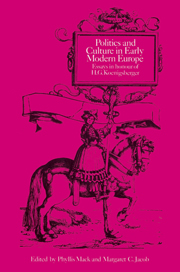Book contents
- Frontmatter
- Contents
- Introduction
- The court of the Spanish Habsburgs: a peculiar institution?
- The magnificent Lorenzo de' Medici: between myth and history
- Political rhetoric and poetic meaning in Renaissance culture: Clément Marot and the Field of Cloth of Gold
- The unlikely Machiavellian: William of Orange and the princely virtues
- The Estates of Brabant to the end of the fifteenth century: the make-up of the assembly
- Presents and pensions: a methodological search and the case study of Count Nils Bielke's prosecution for treason in connection with gratifications from France
- Between Bruni and Machiavelli: history, law and historicism in Poggio Bracciolini
- Constitutional discourse in France, 1527–1549
- Lieuwe van Aitzema: a soured but knowing eye
- John Calvin's contribution to representative government
- Luther and the humanists
- Scholars and ecclesiastical history in the Early Modern period: the influence of Ferdinando Ughelli
- ‘By an Orphean charm’: science and the two cultures in seventeenth-century England
- The crisis of the European mind: Hazard revisited
- Isaac Beeckman and music
- Decadence, shift, cultural changes and the universality of Leonardo da Vinci
- Bibliography of the writings of HELMUT GEORG KOENIGSBERGER
- Index
Decadence, shift, cultural changes and the universality of Leonardo da Vinci
Published online by Cambridge University Press: 20 October 2009
- Frontmatter
- Contents
- Introduction
- The court of the Spanish Habsburgs: a peculiar institution?
- The magnificent Lorenzo de' Medici: between myth and history
- Political rhetoric and poetic meaning in Renaissance culture: Clément Marot and the Field of Cloth of Gold
- The unlikely Machiavellian: William of Orange and the princely virtues
- The Estates of Brabant to the end of the fifteenth century: the make-up of the assembly
- Presents and pensions: a methodological search and the case study of Count Nils Bielke's prosecution for treason in connection with gratifications from France
- Between Bruni and Machiavelli: history, law and historicism in Poggio Bracciolini
- Constitutional discourse in France, 1527–1549
- Lieuwe van Aitzema: a soured but knowing eye
- John Calvin's contribution to representative government
- Luther and the humanists
- Scholars and ecclesiastical history in the Early Modern period: the influence of Ferdinando Ughelli
- ‘By an Orphean charm’: science and the two cultures in seventeenth-century England
- The crisis of the European mind: Hazard revisited
- Isaac Beeckman and music
- Decadence, shift, cultural changes and the universality of Leonardo da Vinci
- Bibliography of the writings of HELMUT GEORG KOENIGSBERGER
- Index
Summary
… metamorphoses were popular among the Jews and the Pythagoreans.
PicoNumerous tales of decline, fall and decadence have provided striking images for students of cultural history, images that have continued to be popular. The current emphasis on basic economic changes in Western society has not altered this perspective; the same images of decline and fall have simply reappeared in new contexts. However, H. G. Koenigsberger was not always convinced by them, especially when it came to the history of creative achievements. Instead, he suggested that historians might explore shifts in creative activities; shifts which were not necessarily tied to see-saw patterns. For example, instead of focussing solely on decadence in literary and artistic achievement in Italy towards the end of the sixteenth century, historians should also include advances in the music and natural philosophy of the period. Descriptions would move from tracing a down-swing in certain fields to the more positive task of exploring the whole meaning of shifts in activity. Deterioration in some areas of creative endeavour and in certain cultural milieux might then be balanced by new emphases, albeit with significant differences in geographical, temporal, social, and political conditions.
Helli Koenigsberger's later pieces refined the concept of cultural shifts; music, religion, natural philosophy and the arts were all
In 1960, Helli Koenigsberger kindly sent me an off-print of his paper, ‘Decadence or Shift?
- Type
- Chapter
- Information
- Politics and Culture in Early Modern EuropeEssays in Honour of H. G. Koenigsberger, pp. 285 - 304Publisher: Cambridge University PressPrint publication year: 1987



